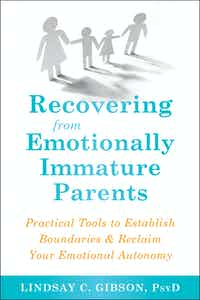By Lindsay C. Gibson, PsyD, author of Recovering from Emotionally Immature Parents
It’s a popular idea that nobody can make you feel anything. On first take, this feels strengthening because it restores your power of choice. No longer do you have to succumb to other people’s moods and manipulations. But like many catchy sayings, this one is only partly true.
Before you get to the point where you can control your reactions to others’ behavior, remember that all interactions have the potential to take over your emotional state before you know what’s happening. It might be technically true that nobody can make you feel anything, but it won’t seem that way when you’re face-to-face with an emotionally immature (EI) person who wants their way. If you’re not aware of their subconscious influence, the insistence of their mood will infiltrate your serenity like a toxic cloud. You will find yourself reacting to their emotional demands, agreeing to take on responsibility for making them feel better.
In his classic book on psychopaths, The Mask of Sanity, Hervey Cleckley said he could always diagnose psychopaths because they were the ones he lent money to. He was citing the effectiveness of the psychopath’s emotionally immature relationship system (EIRS), which I explain in my new book, Recovering from Emotionally Immature Parents. Like Cleckley, when you get pulled into someone’s EIRS, you lose sight of how the interaction is going for you. Instead you become fixated on their feelings, blindly accepting that their problems should take precedence over your needs. You implicitly agree that they are more important than you. Besides, their emotional urgency makes you feel mean and selfish if you don’t instantly go along with them. But once you give them what they want, you may still worry that you haven’t done enough. In those reactive moments, you completely lose sight of what’s best for you. We absorb their needs and moods through our hyper-responsive social neurology, like it or not.
As human beings, this emotional absorption is both our strength and our weakness. In Stephen Porges’ polyvagal theory, he explains how we can regulate each other’s mood and sense of security through proximity, touch, soothing voice, and warm facial expressions. Conversely, we can downregulate each other’s well-being by making others feel emotionally unsafe. Just as a sudden fright will set off a body alarm, other people’s emotional responses can make you feel insecure, disapproved of, and even rejected. If you’re not aware of what they’re doing, you will fall into it automatically. As long as you are unconscious of the powerful EIRS dynamic, they can make you feel bad.
The EIRS is normal for babies and small children. The contagious nature of a child’s distress can easily upset emotionally healthy adults. A baby’s life depends on being able to cause distress in the parents just by fussing and crying. In this way, the EIRS can be a healthy dynamic in close relationships, prompting us to feel empathy for another’s distress. Also, if we’ve hurt someone, their pain can make us feel bad enough to want to make amends.
However, this emotional interdependence also means that EI people and parents have a tool to convince others to do what they want. For instance, unscrupulous leaders can use emotional incitements to rally crowd support for destructive ideologies. Controlling spouses can gain power with cold shoulders or dirty looks, while EI parents threaten attack or loss of love to stop their children’s undesired behavior.
The EI person’s demand may be unreasonable and your rights clear, yet saying no can feel virtually impossible. If you resist their request, you may feel involuntary twinges of fear, guilt, shame, or self-doubt. You may then take responsibility for stabilizing their self-esteem and sense of security. Once you accept accountability for their moods on their terms, they may turn cooperative and pleasant again. Meanwhile, you will be left with resentment and a vague sense of self-betrayal about getting trapped in something you didn’t want.
Fortunately, you don’t have to be taken over by the unconscious pressure of EI people’s moods and demands. Once you become aware that the other person is trying to make you feel fear, shame, guilt, or self-doubt, you are once again the master of yourself. Then it will seem silly to think you are the cause of their unhappiness. You’ll realize that EI people create their own unhappiness by always expecting others to make them feel better.
As soon as you feel controlled by shame, guilt, self-doubt, or fear—and especially if it feels rude to speak up for yourself—it’s time to back up and give yourself time to think. EI people always push for an immediate response, but few situations are really that urgent. Ask yourself why you are worrying so much about them. Is the person so thin-skinned you are afraid of offending them? Are they so peevish you fear a backlash if you don’t capitulate immediately? Are they making you feel that you owe them something when you don’t? If so, it’s time to remember that relationships are two-way streets and you don’t have to feel bad for not giving in.
Give yourself time to sort out the cost to you of what they are asking for. Remind yourself that your well-being is just as important as theirs and you are not less deserving than they are. Then figure out the outcome you want and keep moving in that direction regardless of their pressure tactics. By becoming conscious of how they are making you feel, you can correctly label it as emotional coercion. Just naming their attempted takeover releases you from blind reactivity. They are not your infant, and you are not responsible for their inner emotional regulation. If they are adults, you let them manage their own discomfort. Consciously deciding to step away from emotional coercions makes you healthily self-protective; it can never make you a bad person.
 Lindsay C. Gibson, PsyD, is a clinical psychologist in private practice who specializes in individual psychotherapy with adult children of emotionally immature parents. She is author of Adult Children of Emotionally Immature Parents and Recovering from Emotionally Immature Parents.
Lindsay C. Gibson, PsyD, is a clinical psychologist in private practice who specializes in individual psychotherapy with adult children of emotionally immature parents. She is author of Adult Children of Emotionally Immature Parents and Recovering from Emotionally Immature Parents.


 2024 Peace Playbook: 3 Tactics to Avoid Clashes with Your Partner
2024 Peace Playbook: 3 Tactics to Avoid Clashes with Your Partner